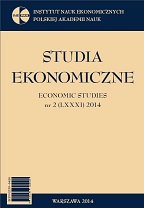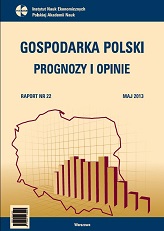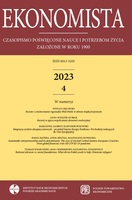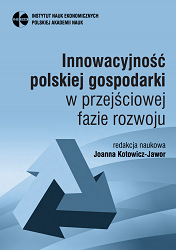
Economic Studies
Studia Ekonomiczne
Quarterly "Economic Studies" is a scientific journal published by Institute of Economics of the Polish Academy of Sciences.
More...
Quarterly "Economic Studies" is a scientific journal published by Institute of Economics of the Polish Academy of Sciences.
More...
The report "Polish Economy - Forecasts and Opinions" is a research project of the Institute that presents current state of the Polish economy. It has been running since 2002. Twice a year, at the turn of April and May and October and November the new issue of report comes out. It contains forecasts of the basic macroeconomic indicators for the next six months and analyses of the various sectors of the Polish economy. Since 2002 the Institute of Economics of Polish Academy of Sciences prepares biannual Report about the state of Polish economy. The initiator of the Report was a prof. Zbigniew Hockuba, currently the report is created by a team of economic experts led by prof. Krzysztof Bartosik. In the framework of the programme team of Institute’s experts prepares an assessment of the state of Polish economy and formulates forecasts regarding its condition in the near future. The result of the team’s effort is a report published twice a year (spring and autumn) entitled „Polish Economy – Forecasts and Opinions”. Thus far nineteen editions of the report have been presented. Report no. 19 was published in November 2011. The team of authors is composed of young economists and the scientific community assesses their fresh perspective on the mechanisms of functioning of the Polish economy as very professional and appreciates insightfulness of many results and correctness of forecasts. Each report includes short-term forecasts of key macroeconomic parameters prepared with the use of constantly-improved vector-autoregressive model (VAR). Using the quarterly data gathered for over ten years, the following economic indices are estimated: rate of GDP growth, manufacturing production, domestic demand, investment, exports, imports, unemployment rate, and inflation dynamics. A part from forecasts, each Report shows the Polish economic situation six months back and analysis the condition of sectors, comprising the domestic product – households, enterprises, government and financial institutions. Reports also include analyses of international context with its external determinants of Polish economic growth as well as considerations and assessments dedicated to Poland’s membership in the European Union. Reports are ended with a commentary of recent economic events made by economists and economic politicians, invited to take part in a discussion.
More...
„Ekonomista” publishes original research papers in economics in English and Polish. All submitted papers that are within the scope of the journal and in accordance with journal’s editorial standards are assessed by reviewers in a double-blind peer review procedure and approved for publication by the Editorial Board.
“Ekonomista” was founded in 1900 what makes it the oldest scientific journal within the field of broadly understood economic sciences in Poland. It is highly appreciated by Polish academic economists and business practitioners.
More...
Keywords: innovativeness of economy; Poland; innovativenes factors; exogenous and endogenous barriers; stages of economic development;
A research question that has not been satisfactorily answered in the relevant literature is what are the reasons for low efficacy of EU-funded public support programs dedicated to increasing innovativeness of Polish enterprises. The aim of the study undertaken by the team of researchers at the Institute of Economics of the Polish Academy of Sciences is to establish interrelationships between the current stage of development of the Polish economy and determinants of its innovative capacity in the context of absorption of EU structural funds. It is hypothesized that the current stage of transition between investment- -driven and innovation-driven economy defines the main supply-side and demand-side determinants of innovation processes that condition efficiency of EU structural funds’ support. Individual chapters present a number of detailed hypotheses that are then verified on the basis of empirical data derived from questionnaires, interviews and a model of the level of economic development and innovativeness of the country. The study presents a number of recommendations for economic policy.
More...